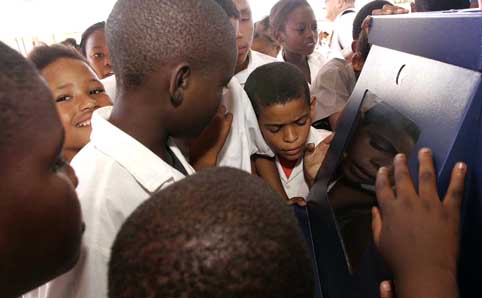 |
Learners of the Heidedal community looking at the new computer system.
Photo: Johan Roux |
The combined effort of ICTISE (ICT Innovation in School Education), Reach and the Heidedal community saw a four-station Digital Doorway (computer system) being placed on the premises of Reach at the end of 2010. ICTISE is a programme of the University of the Free State (UFS) and operates from the university’s South Campus. This computer system will allow all Heidedal schools and community members to have free access to computers.
Prof. Jonathan Jansen, Vice-Chancellor and Rector of the UFS, opened the Digital Doorway by cutting a ceremonial ribbon with the assistance of one of the community’s learners.
The Digital Doorway concept originates from a joint initiative between the Department of Science and Technology and the Meraka Institute of the Council for Scientific and Industrial Research. The Digital Doorway consists of four screens and allows access to select content, including open-source application software. This includes audio books, subject textbooks, encyclopaedia, educational games such as “touch maths” and quizzes as well as useful information for school subjects and a newspaper especially for children.
The Heidedal Digital Doorway is the first of its kind in the Motheo District. Typically, one or two kids will be working on each of the computers, while up to five other learners will be giving instructions, allowing the whole group to learn. The Digital Doorway is a smart way of bridging the digital divide, bringing science and technology to our community and opening the doors of learning. ICTISE will support the Heidedal schools to make full use of this new facility by training teachers and community members.
“The UFS hopes that this project will change the lives of the Heidedal community by providing the youth with an opportunity to be in line with the changing world of technology,” said Ms Sarietjie Musgrave, Head: ICTISE.